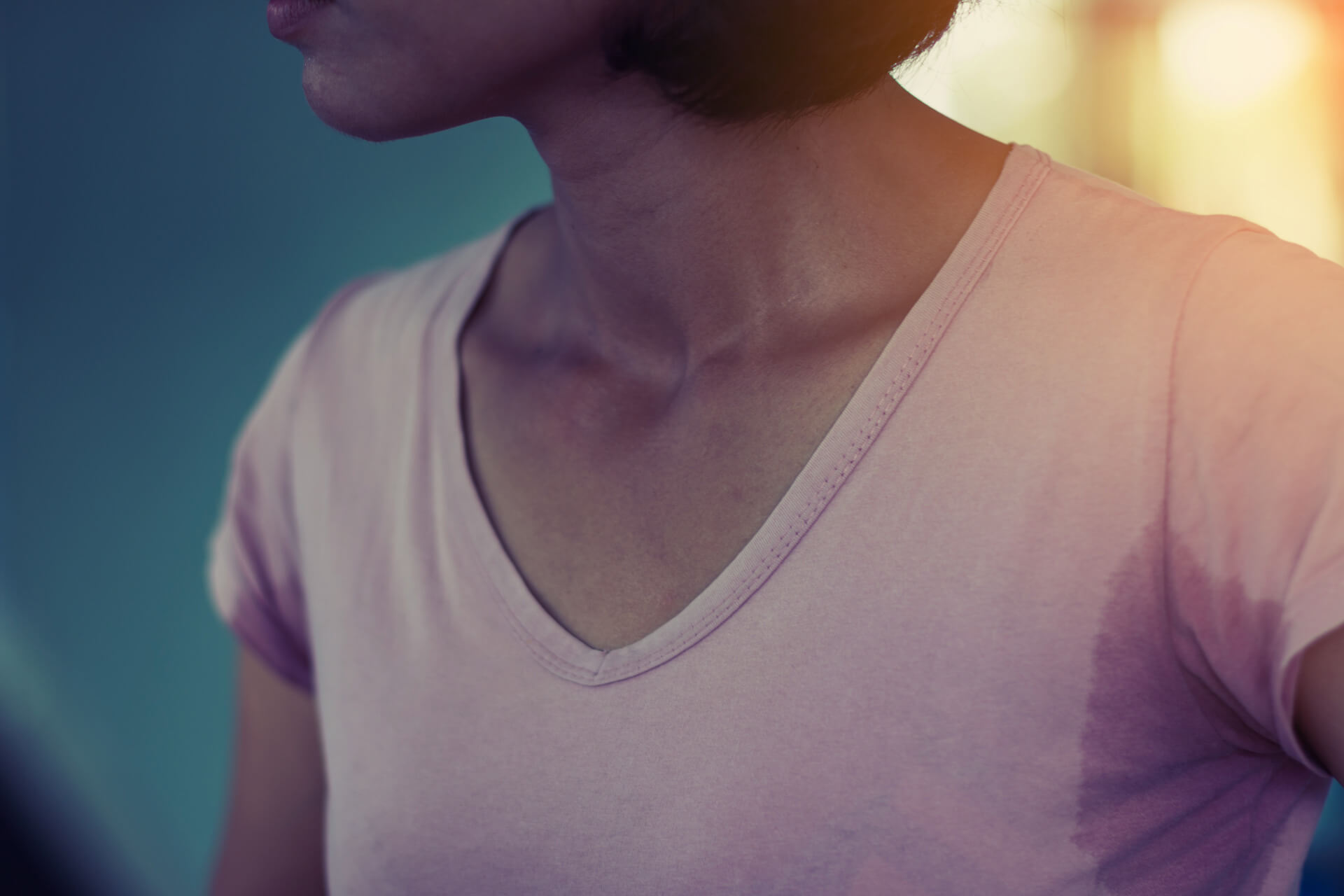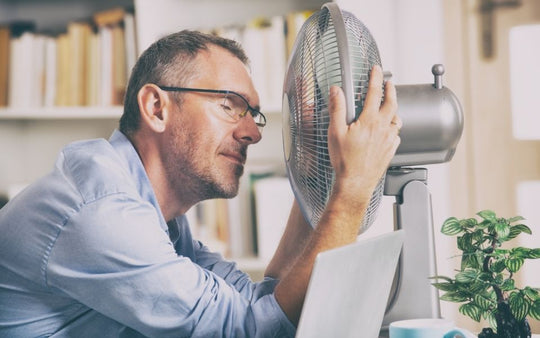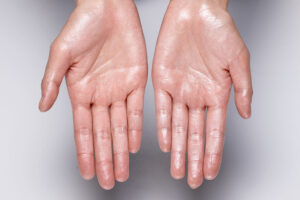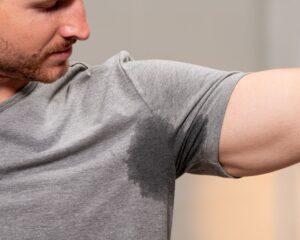Table of Contents
It sounds like an oxymoron, but breaking out in a case of the cold sweats is a real problem for many people. While normal sweating is part of the body’s normal cooling response, breaking out in a cold sweat is usually due to sudden fear or stress, which kicks in your body’s “fight-or-flight” stress response. While cold sweats by themselves aren’t usually a health risk, they can be a sign of more serious health issues.
Top 8 Causes of Cold Sweats
1. General Anxiety
2. Hypoglycemia
3. Heart Attack
4. Hormonal Changes
5. Pain or Shock
6. Infection
7. Alcohol or Drug Withdrawal
8. Medication Effects
People in the middle of a cold sweat often have clammy skin and report feeling cold; they may also seem unusually pale. Cold sweats can break out on your palms, armpits and even the soles of your feet.
What Causes Cold Sweats?
The medical term for sudden, excessive sweating is diaphoresis. This kind of sweat isn’t caused by heat or exertion. It’s set apart from regular sweating by what the person is doing when the sweating cranks up.
Under normal conditions, your body produces sweat in order to cool down your body temperature – typically in response to environmental factors like the temperature on a hot summer day or when exercising. But with cold sweats, your sweat glands are being abnormally activated by something other than heat or activity, such as your built-in stress response.
While the specific details are all over the map, most cold sweats can be traced back to our ancient fight or flight response, which readied our ancestors’ bodies to either battle it out with an enemy or get the heck out. The fight or flight response still makes us break out in cold sweats today, but it’s more likely to be triggered by a traffic jam or a big presentation rather than marauding invaders or wooly mammoths. When you’re in fight or flight mode, your heart rate speeds up, you start breathing more shallowly, your mouth goes dry and your sweat glands open up — and then start the sweat pouring. Since you’re usually not fighting for your life when this happens, it can be a little embarrassing.
Top 8 Causes of Cold Sweats
Depending on your unique physiology and stress response, cold sweats could be triggered by a variety of different things, but the following list represents some of the most common causes.
1. General Anxiety
A panic attack, generalized social anxiety, or other types of anxiety are some of the worst offenders for triggering a cold, clammy sweat. If this is something that happens to you, or you experience levels of anxiety that truly feel overwhelming, make sure to talk with your doctor about treatment options for the root cause of your cold sweats.
Cold sweats related to anxiety are often a result of the stress that your anxiety is putting on your body, which often keeps oxygen from getting to your brain and other vital organs. This kind of anxiety disorder can cause long-term health hazards and be extremely limiting to your quality of life, so it’s something you definitely want to talk with your doctor about.
2. Hypoglycemia
When someone’s blood sugar levels drop to well below normal, that can trigger a cold sweat. This is another serious health condition, especially for people with diabetes. When the blood sugar drops dramatically, your brain processes this change as a dangerous drop in oxygen and triggers the same response: cold sweats. Most of the time, drinking fruit juice or eating something with a small amount of natural sugar can help get the blood sugar back up to a healthier level.
3. Heart Attack
Sometimes people having a heart attack break out into a cold sweat – they also typically experience chest pain, intense pressure in the chest or upper body, shortness of breath, and have waxy, clammy skin. If you find yourself — or anyone else — with sudden chest discomfort, get medical attention immediately.
4. Hormonal Changes
Hormone levels can fluctuate, especially for people in menopause or perimenopause – this can sometimes lead to hot flashes, cold sweats, and even night sweats. The same happens during pregnancy and during puberty, for both boys and girls. In addition, thyroid disorders can lead to hormonal imbalances that can send your sweat glands for a loop. Along with sudden, uncontrollable hot flashes and cold sweats are one of the telltale signs of menopause.
5. Pain or Shock
When we suffer intense pain due to an accident or severe injury — or even a migraine — cold sweats are pretty common. If the profuse sweating comes with low blood pressure and a high heart rate, you might be dealing with a case of shock – and you should seek medical care immediately. When you’re suffering from shock, you’re getting dangerously low blood flow to your vital organs, including the brain.
If you’re offering first aid to someone who might be showing symptoms of shock, recognizing the cold sweat is an important clue, and you should get emergency medical help immediately. In the meantime, having the person lie flat on his back while elevating the feet can help. Ultimately, treating the injury itself and managing the symptoms associated with shock can bring the cold sweats under control.
6. Infection
Sometimes, if your body is fighting off an infection – especially something severe like tuberculosis or HIV – sweaty and cold, clammy skin can be a sign of your body’s response to that infection. An infection typically kicks your immune system into high alert, leading to a cold sweat. Any infection that spurs a fever can cause hot flushes and sweats, but tuberculosis is the infection most often associated with sweating at night. In addition, sepsis, the most severe type of infection, can often lead to shock, which usually brings with it a case of the cold sweats.
7. Alcohol or Drug Withdrawal
For anyone going through the process of stopping alcohol or drug use, there are often unpleasant side effects. One common side effect is breaking into a sudden cold sweat – and these symptoms can set in quickly, as fast as four to 12 hours after the last dose of drugs or alcohol, according to some estimates. The body’s response to a lack of neurochemicals is to trigger symptoms that sound a lot like a bad case of the flu-like excessive perspiring, confusion, insomnia, nausea, body aches, heart palpitations, and more.
8. Medication Effects
A wide collection of medications, including hormone replacement therapy, antidepressants, powerful pain relievers, and steroids can sometimes cause people to break out in a cold sweat. Some you might be familiar with include albuterol, hydrocodone, insulin, and even naproxen sodium. If you suspect that your cold sweats are connected to a medication you’re taking, you should reach out to your doctor for a blood test to see if you can get your dosage or the medication itself adjusted.
Cold Sweats vs. Night Sweats: What’s the Difference?
The term night sweats refers specifically to a condition also known as sleep hyperhidrosis. It can leave your jammies drenched and your sheets in a puddle, but it’s unrelated to the core temperature of your body heating up while you sleep. Sometimes night sweats can be a sign of a serious medical condition, so if sweat is plaguing your dreams, you should definitely reach out to your doctor to discuss.
For example, sometimes obstructive sleep apnea (a narrowing of the throat walls, which restricts breathing during sleep) can cause cold sweats at night. In fact, those who suffer from sleep apnea are three times more likely than the general population to have cold sweats while sleeping. Sometimes night sweats also come along with GERD – gastroesophageal reflux disease. In addition, some cancers, especially lymphoma and leukemia, trigger nightly cold sweats as an early sign of the disease.
Night sweats typically result in a layer of sweat over your entire body, while cold sweats are usually more localized – like on your palms, underarms, and feet.
Treatment Options
As it turns out, there’s no specific treatment for cold sweats. When it comes to relieving a cold sweat, your best bet is to try to address its root cause. If you break out in a cold sweat because of anxiety, for example, you may find relief with options like meditation and yoga that help reduce your stress. Your overall goal is to make sure you’re getting plenty of oxygen to your brain, which meditation and yoga both support by forcing you to focus on your breathing. Cognitive behavior therapy can also be extremely helpful in addressing the areas of your life that trigger the fight or flight reaction.
In addition, getting regular, daily exercise and maintaining a healthy weight can help with how your body processes stress. In other words, the perspiration itself isn’t necessarily the problem – it may be an indicator of a deeper issue. Also, make sure to drink plenty of water.
While you’re working out your causes for cold sweats, you can do simple things to help with sudden cold sweats. Keep your skin clean and dry, shower regularly, and maybe even adjust your diet. Some foods and beverages, like caffeine, for example, can make people sweat more, so minimizing or removing them from your diet completely may help. You may want to avoid alcohol, nicotine, caffeine and/or spicy foods if you notice excessive perspiration after eating or drinking them. It might not be fun to cut those from your diet, but it’s at least worth a shot if it can keep you from turning into a clammy puddle. You may need to talk to your doctor about adjusting medication or correcting hormone imbalances if you believe those are contributing to your frequent cold sweats.
It’s also a good idea to invest in an antiperspirant you can count on to help control your cold sweats and any odor they might bring with them. You can apply an antiperspirant at night before you go to sleep so that it has a chance to work all night.
Treating Your Cold Sweats
The cold sweats can be annoying, and also a little scary if you think they’re signaling a broader health issue. Don’t be afraid to talk with your doctor if you find yourself breaking out into constant cold sweats without an obvious trigger.
Nearly everyone experiences cold sweats at some point in their lives, and there are several causes of cold sweats that are not emergency-related – like hormonal changes or day-to-day anxiety. If you have a serious, ongoing issue with cold sweats, talk to your doctor to make sure there isn’t a deeper issue going on that needs to be treated.
You might also like...

Why Do I Sweat So Much? And So Easily?
WHY DO I SWEAT SO MUCH? : ARTICLE CONTENTS Sweating a lot? … when you workout, sleep, after eating, or

What is Focal Hyperhidrosis? Symptoms, Treatments, & Tips for Managing It Successfully
Table of Contents Does excessive sweating bother you? Keep you from being social? Or make you feel like you can’t

How to Stop Sweating So Much? 9 Tips to Beat Unwanted Sweat
If you’ve ever suffered through an awkward sweaty hug, a slippery handshake, or a sweat-soaked job interview — this article
















